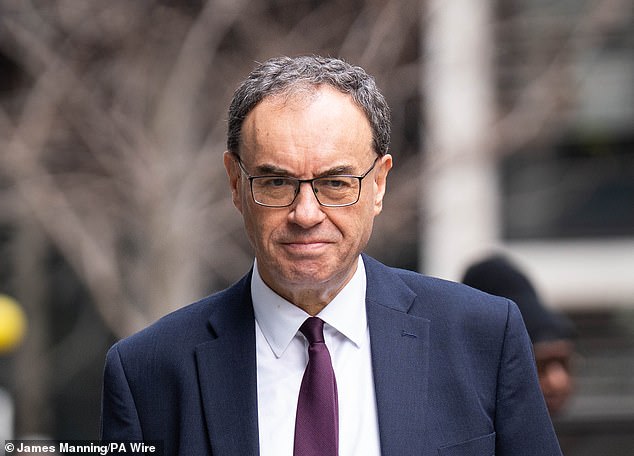[ad_1]
The governor of the Bank of England, Andrew Bailey, could throw Chancellor Rachel Reeves a lifeline this week if he slows down a controversial debt-selling programme that is costing taxpayers billions.
Reeves is under pressure to find savings ahead of her Budget in November, which is likely to see another round of big tax rises to plug a hole of up to £50 billion in the public finances as economic growth stalls and government borrowing costs creep higher.
She may be given a welcome lift if, as experts expect, the Bank decides to slow the pace of debt sales.
After the 2008 financial crisis, the Bank bought £895 billion of bonds – Government debt or IOUs – to help keep the economy afloat. It bought this debt at very high prices from commercial lenders when interest rates were ultra-low. Bond prices go up when rates go down, and vice versa.

Helping hand: The governor of the Bank of England, Andrew Bailey (above), could throw Chancellor Rachel Reeves a lifeline
But since 2022, the Bank has been selling this debt on the open market at a loss to the taxpayer after interest rates shot up to combat inflation. This is because the Treasury receives any profit from the sale of government debt, but is also liable for any losses, eating into the money available for the Chancellor to spend elsewhere.
If the Bank slows down the debt sales, these losses will be lower.
The influential IPPR think-tank recently urged the Bank to sell fewer bonds to cut the government’s losses from the scheme, known as quantitative tightening (QT), which are currently costing taxpayers £22 billion a year.
‘What started as a programme to boost the economy is now a massive drain on taxpayer money,’ said IPPR’s Carsten Jung.
The Bank, which is independent from the Government, has been selling the bonds at the rate of £100 billion a year.

However, City experts say this could be cut to nearer £70 billion, easing pressure on the public purse.
But Bailey would be walking a fine line if the pace of bond sales slows down.
‘Some would see this as a slippery slope,’ said David Aikman, director at the National Institute of Economic and Social Research. ‘Once QT is adjusted to ease fiscal pressures, where does it stop?’ he added.
‘Its decisions on QT cannot be made independently of fiscal realities,’ Aikman said.
The Bank will announce whether it will slow down its bond selling on Thursday, when it is also expected to keep interest rates at 4 per cent.
Hopes of a rate cut before Christmas are fading as inflation stays stubbornly high.
DIY INVESTING PLATFORMS

AJ Bell

AJ Bell
Easy investing and ready-made portfolios

Hargreaves Lansdown

Hargreaves Lansdown
Free fund dealing and investment ideas

interactive investor

interactive investor
Flat-fee investing from £4.99 per month

InvestEngine

InvestEngine
Account and trading fee-free ETF investing
Trading 212
Trading 212
Free share dealing and no account fee
Affiliate links: If you take out a product This is Money may earn a commission. These deals are chosen by our editorial team, as we think they are worth highlighting. This does not affect our editorial independence.
[ad_2]
This article was originally published by a www.dailymail.co.uk . Read the Original article here. .

